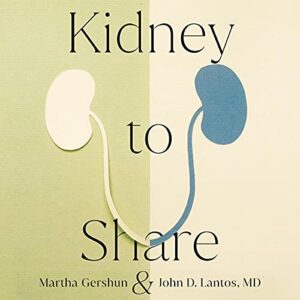 Over the holidays, I finished Kidney To Share, a new book by Martha Gershun And John D. Lantos published by Cornell University Press and highly recommend it! It’s extremely well-done—informative, funny, thought-provoking.
Over the holidays, I finished Kidney To Share, a new book by Martha Gershun And John D. Lantos published by Cornell University Press and highly recommend it! It’s extremely well-done—informative, funny, thought-provoking.
The book alternates between chapters from Martha and John, with Martha taking readers through a personal account of her non-directed kidney donation to a woman she had never met but shared a number of social connections with and whose story she came across in a local media story. John’s chapters place Martha’s personal experience within the larger context of the history and ethics of living kidney donation.
It is a fascinating account. You will read this and marvel at the fact that anyone would complete the expensive, time-consuming, and opaque process to become a living donor for a complete stranger. This is a terrible state of affairs, and not only because the transplant waitlist currently stands at over 100,000 people (the vast majority of them waiting for a kidney) and we need more living donors to address the shortage. But also because, as I was reminded during the ugly “Bad Art Friend” affair, living donors deserve better treatment.
Much of the work on the kidney shortage focuses on risks to donors and (as the book notes) debates over whether financial incentives can safely increase the number of donors. But Martha and John highlight the numerous other hurdles faced by would-be donors, that are almost never discussed. As Martha details in the book, at the time of her decision, she was a recently-retired business executive with a spouse still working. Time and time again problems that should have been solved by Mayo were left to her creativity and research skills to solve, expenses that should have been covered by insurance were personally paid by her or her recipient, and she had to advocate for herself and her donation in ways that no donor should have to. Most would-be donors do not have the time, money, dedication, confidence, and advocacy skills to take on this task. And Martha tells these stories with grace and humor – from a dry ice snafu to the problems caused by a (legal) marijuana encounter, the book’s ultimately happy ending is a long time coming and not at all a guaranteed result.
I highly recommend Kidney to Share. There’s even a (very well read) audible version for folks like me who prefer to multitask.
